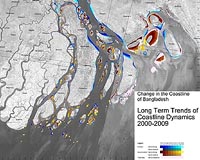| . |  |
. |
Edinburgh, UK (SPX) Mar 29, 2010 Acidification of the oceans as a result of increasing levels of atmospheric carbon dioxide could have significant effects on marine ecosystems, according to Michael Maguire presenting at the Society for General Microbiology's spring meeting in Edinburgh this week. Postgraduate researcher Mr Maguire, together with colleagues at Newcastle University, performed experiments in which they simulated ocean acidification as predicted by current trends of carbon dioxide (CO2) emissions. The group found that the decrease in ocean pH (increased acidity) resulted in a sharp decline of a biogeochemically important group of bacteria known as the Marine Roseobacter clade. "This is the first time that a highly important bacterial group has been observed to decline in significant numbers with only a modest decrease in pH," said Mr Maguire. The Marine Roseobacter clade is responsible for breaking down a sulphur compound called dimethylsulfoniopropionate (DMSP) that is produced by photosynthesising plankton. This end product is taken up and used by numerous bacteria as an important source of sulphur. A fraction of DMSP is turned into Dimethylsulfide (DMS) - a naturally occurring gas that influences the Earth's climate. DMS encourages the formation of clouds which reflect solar radiation back into space leading to a cooling of the earth's surface. Mr Maguire's group hypothesizes that the decline of the Marine Roseobacter clade through ocean acidification may alter the release of DMS into the atmosphere and affect the amount of available sulphur. He believes this will have a significant impact on the ocean's productivity and the overall global climate system. "Ocean acidification will not only have large scale consequences for marine ecosystems but also socio-economical consequences due to changes in fish stocks and erosion of coral reefs," he explained.
Share This Article With Planet Earth
Related Links Society for General Microbiology Water News - Science, Technology and Politics
 Vanishing island solves India-Bangladesh dispute
Vanishing island solves India-Bangladesh disputeKolkata (AFP) March 25, 2010 A tiny island at the centre of a territorial dispute between India and Bangladesh has disappeared beneath the waves due to rising sea levels and erosion, scientists say. The uninhabited outcrop - called New Moore island by India and South Talpatti by Bangladesh - was 3.5 kilometres (about two miles) long and 3.0 kilometres wide before it was swallowed up by the Bay of Bengal. "There's ... read more |
|
| The content herein, unless otherwise known to be public domain, are Copyright 1995-2010 - SpaceDaily. AFP and UPI Wire Stories are copyright Agence France-Presse and United Press International. ESA Portal Reports are copyright European Space Agency. All NASA sourced material is public domain. Additional copyrights may apply in whole or part to other bona fide parties. Advertising does not imply endorsement,agreement or approval of any opinions, statements or information provided by SpaceDaily on any Web page published or hosted by SpaceDaily. Privacy Statement |